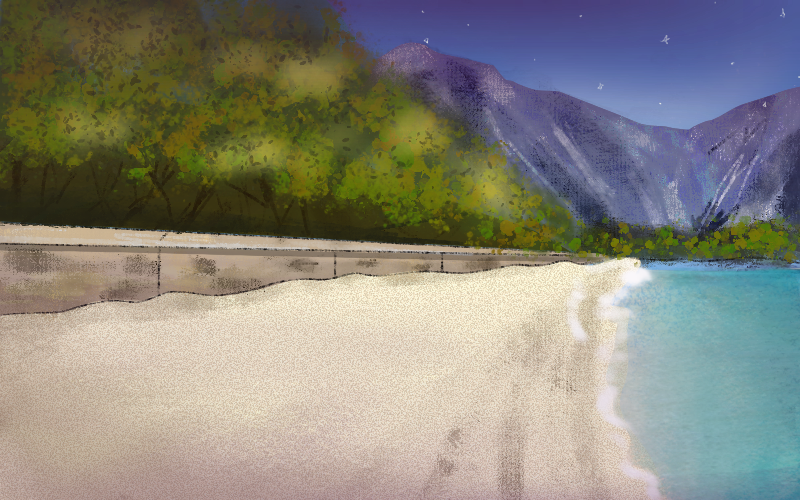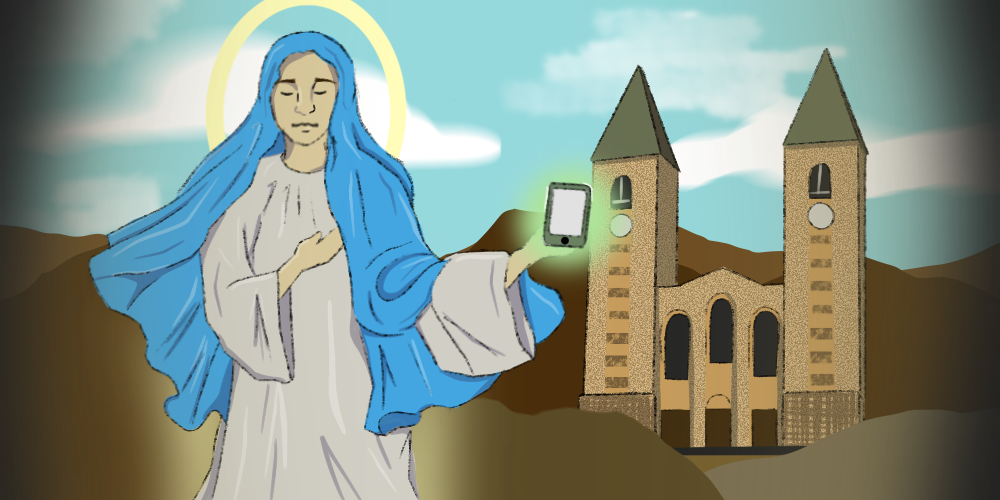4:44 reads the entry ticket at Edinburgh airport long stay car park. The flight isn’t scheduled for another two hours. When you mentioned it, your colleagues raised eyebrows: Medjugorje — since 1981 the site of ongoing apparitions of the Blessed Virgin Mary, but you can only either dive in headfirst or altogether walk away when confronted with this sort of thing. Your third visit in as many years, but there’s still something mysterious. Perhaps it’s the location, a dusty Bosnian mountain town outside of the EU, but you are persuaded by the stream of pilgrims testifying to something glorious, peaceful, and pure.
The previous evening you traveled down from the Scottish highlands where you are spending the summer holidays. Now you find yourself staring at a cup of coffee. The artificial airport light reflected in glass. A paperback copy of Notes from the Underground — you’re strangely attuned to Dostoevsky’s protagonist. You hope that this pilgrimage will bring peace, but little do you know what the journey has in store.
The sun emerges over the tarmac as you board the flight to Croatia. The shuttle doors hiss shut behind you in Zadar old town. Mooring rings on the harbor wall, 40-degree heat, and the unforgiving sun blazing overhead, you stumble into the nearby Cathedral where acolytes glide through the rows of sonorous voices. Off to the side, a priest silently nods in the confessional, closing and opening and closing the small window. You stuff your backpack under a pew as the faithful rise to recite the creed. The white marble, the incense, the votive candles. From the organ comes sound which rises from another world.
In the afternoon you drink beer in a park overlooking the turquoise water. With closed eyes your eyelids burn beneath a sky ablaze; you just lay down and sleep without pausing to consider the idiosyncrasies of the light, or whether you can ever know a greater happiness. In your dream, lovers embrace, families laugh, and a group of friends plays volleyball in the sand. In the distance, a group is diving from a communist-era platform that rises from the water. In the end, you find a locker and leap heartily in too. When you emerge for the final time the beach is emptier and the air cooler. You feel a stinging sensation and glance down at your bruised and scraped legs. In the old town, you find a café and finish off the chapter you were reading.
It is late by the time you think about finding somewhere to sleep, the last remaining bed in a backpacker’s hostel which turns out to be an hour’s walk along the seafront. You didn’t realize this because you didn’t bring a phone on this pilgrimage. No internet and no calls or SMS. You wanted to do this the old way, like your parents might have done in the early ’90s, so you are forced to ask for directions. The locals are quizzical — who asks for directions in the smartphone age?
Eventually, after several detours, you arrive at the hostel where you meet a fellow teacher. “My Father trained to become a Catholic Priest” your drinking partner explains when you mention your destination. “Yes, it’s true. He did seven years at seminary in Leuven, took his vows. Then he met my mother, and one thing led to another . . . now he’s an Anglican vicar.”
By the time you stagger back to the hostel, you have discussed all the nuances of sacramental theology. Even at this hour, the cobbled square is lit up and awake. In the courtyard, you chat lazily with a group of Germans and Eastern Europeans.
“North Macedonia.” A friendly girl explains, and you share a listless conversation.
She tells you she is working at a tech start-up in Sofia, something to do with linguistics and speech software. “Perhaps we share names for experiences that aren’t even mutually imaginable.” She says: “If the idea that exists in the mind is simply a door through which you leave the world in which it occurs, how can you ever really be sure you have been understood by another person?”
At the bus station the following morning you meet a couple from your hometown, but you aren’t surprised, Croatia is teeming with Brits. With no smartphone, you are reliant on others for updates, but many look at you sideways when you ask for the time, or what the next stop is. You find yourself having to be more observant, looking for clues and guessing directions.
The crowded bus weaves along the coast to Split. At least you think you are in Split, in reality, you have alighted prematurely in another town. But you are ignorant of this fact, so you search for a chemist to buy antiseptic cream for your cut legs. Bandaged up, you stop for a drink and doze off to sleep. When you wander over to the bus station in good time your mistake becomes apparent. The missed connection means you are forced to wait for the following morning. Eventually, a local bus takes you to Split where you head down to the beach.

With no smartphone, you are forced to sit and think — struck by the natural beauty against the harsh artificial lights and sounds. How can the infinite and the present coexist? A party is gaining momentum. A conga procession forms, and revelers wade out into the floodlit bay. Young hedonists spend life like borrowed money asking what is love, or if it matters. When is pleasure anonymous? When is life? No one stops to think about getting older. The manicured lawns and asphyxiating conformity of parents form lasting impressions. Nothing can revive the glory of youth. The most profound change occurs inadvertently when you’re caught up in a series of movements. Why is everyone striving to become something, and why does the world seem forever on the cusp of destruction, and continuously being saved?
The beat still pulses, and the strobes still flicker on the tide. Eventually, you come to realize that there are few simple moments in life. And then you awake and go about your business. But it lingers still, resurfaces as you wander along the seafront to a fast-food kiosk, as revelers stagger past you in search of their beds. A rough sleeper forages through bins for plastic bottles to exchange for a few Kuna, just as he has done for much of his life. At some stage, the journey changes the person. He has learned to survive, understanding what it is to be a piece of unwanted furniture in the world.
Cargo vans screech as they approach the port, ship’s horns blast. The last constellations fall in bunches. Hours pass painfully, slowly, how you regret leaving your phone at home. But then you realize that this is how all pilgrimages once were, before the era of mass movement when journeying was hard and uncomfortable. You think about how the ancient Greeks climbed mountains in search of healing, and how the prismatic nature of the human soul refracts love in a sacred sense.
Dawn is greeted by the arrival of an espresso and icy water. On the next table, you recognize a group from the night before being served beer by a scowling waiter. Finally, the bus creeps through the scorched hills towards Medjugorje. Let your life be a pristine reflection. There is a love that surpasses knowledge. Who works the miracle of grace, it can only be God so that the one thing necessary has already been found. And if the only prayer you said is “thank you” that would be enough.•




